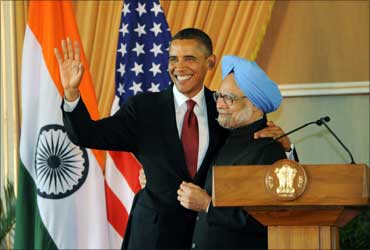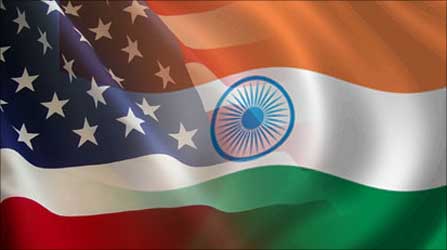 | « Back to article | Print this article |
How Indo-US business can enter boom time
American business believes the best way the United States and India can share high technology with one another is by cooperating in the defence sector, says Ron Somers, president of the US-India Business Council.
He also said that the way to kick off that cooperation in a tangible way would be for India to purchase the 126 medium multi-role combat aircraft from American manufacturers.
Speaking at the conference titled, 'The Rise of India: What it Means for the United States', hosted by the neo-conservative think tank, The American Enterprise Institute, Somers said, "All the big issues of the 21st century are going to be solved by technology and our knowledge partner in this activity will be India. And, I believe that the best way you can begin sharing high technology with one another is by truly, genuinely, fully cooperating in defence."
"Once you begin a defence relationship, where you are sharing your best technologies and your best platforms, the rest will follow," he said.
Click NEXT to read on . . .
How Indo-US business can enter boom time
Then without any further ado, making a pitch for Boeing and Lockheed, who are in the running with the Russian and European manufacturers for this deal worth $11 billion, Somers said, "We are very hopeful that this is going to be a purchase of either Lockheed Martin or Boeing technology by the Indian Air Force."
He acknowledged that India "could choose to go with (the Russian) MiGs again, they could choose to go with the Eurofighter, they could choose to go with the Swedish Gripen or the French Dassault, but the reality is to team up with the United States would not just be a $11 billion arms procurement by the Indian Air Force for 126 fighter aircraft, it really would be the alignment of our militaries for the next two generations."
Somers, said, "When you buy a platform like an aircraft, it isn't just a military hardware sale. It really is training, it's really spare parts, it's really inter-operability and communication between our servicemen to the point where you develop relations and deep trust between our two services so that it lasts well beyond the platform itself -- it really is the alignment of our two defence establishments for the 21st century."
He said, "We all remember the civil nuclear cooperation initiative and we are very thankful that that happened in 2008. But now, we need to get the civil nuclear liability issues right with India -- this is the limitation of liability in the unlikely event of a nuclear accident."
Click NEXT to read on . . .
How Indo-US business can enter boom time
Somers said this issue was "critically important for our companies -- GE or Babcock Wilcox or the Shaw Group or Westinghouse -- to begin in earnest in trading in civil nuclear cooperation with India."
Meanwhile, Somers bemoaned that for all the trade in services and equipment between the US and India, unlike in the early 1990s, "US companies just aren't involved as much as we used to be."
He recalled that in the early and mid-1990s, "US companies would take an equity stake in projects in India as well as go out and help borrow project finance. Those days are gone. Our companies are now selling services, they are selling equipment . . . but very few if any of our companies are taking equity stakes in the country and that causes all of us to take a look at why is that."
Somers asked, "Why is that companies are not as deeply engaged in the $1.7 trillion opportunity of India's infrastructure build-out as they once were back in the 1990s?"
Click NEXT to read on . . .
How Indo-US business can enter boom time
"Is it that the legacy issues of the Dabhol project that are still clouding our though process? I don't believe so," he said, and declared, "That's way behind us. Is it because there is so much opportunity in our own backyard? I doubt that as well. We need to begin thinking globally."
Somers indicated that this malaise apparently was because "the concession agreements in India are not quite tweaked properly enough -- that are not rich enough in returns, do not mitigate risk adequately enough. That our companies have no appetite for going 13,000 miles away for a difficult haircut."
Thus, he argued that it was imperative that "what we really ought to be doing is, laying the concession agreement on the table, whether it is roads, ports, airports, etc."
Somers said it was important to fix and tweak the weaknesses in the concession agreements "so that our companies can go in a big way and take a part of the $1.7 trillion infrastructure build-up" in India.



